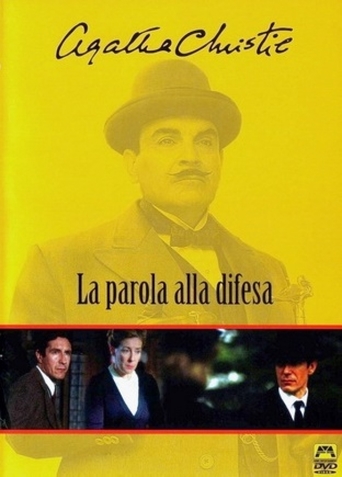

This is a very good adaptation of one of Christie's novels about Hercule Poirot.The pace is great, and the village setting is quite believable. I've never been to an English village, but this is the image I receive of one when reading Christie.The plot is perhaps a little weak as for the motive, and the criminal. Sad Cypress is not one of her best novels. The title is apparently from Shakespeare.There are naturally some divergences from the original story: Mary Gerrard received only 2000 pounds, and not 7000. Elinor Clarlisle actually sold the estate after the death of her aunt.Special praise for the ingenious dream sequence where Poirot sees Mary Gerard's pretty face dissolve into that of an ugly corpse. It is actually one of the best, and scariest, of the kind that I've seen in a long time. I do, however, believe that this was not in the novel.
... View MoreThis tale of the sad death of a dowager who strokes out carries with it a deep moral message which all of us should heed. If you're going to die at all, it is far better to die rich than poor. When you're terribly wealthy, old, and ill, friends and relatives rush to your country estate and lavish their affections on you. They pay attention to your every need. Did you take your medicine? How about another shot of morphine? Would you like some tea? Did you make a will? And when you finally shuffle off this mortal coil, it's from an overdose of morphine which, if you have to go, is the way to do it.The old woman of course had a household full of servants and was being visited by her closest relative, Elinor, Elinor's fiancé Roddy, and the old lady's protégé, the cute blond Mary. Mary and Roddy fall for each other in next to no time and the stricken Elinor returns Roddy's engagement ring. There are several hints that Roddy and Elinor have been playing doctor on a pre-conjugal basis, two lascivious animals. But I don't think Roddy had the time or the opportunity to get it on with Mary. Too bad for him. There is a doctor involved too, who loves Elinor from afar, but he looks a lot like Gabriel Byrne so we may dismiss him as a suspect at once.Elinor (Elisabeth Dermot Walsh) is actually an attractive women but make up has done its best to render her less radiant than the wall-eyed but sensual Mary. Elinor hates Mary.The old lady dies and leaves all her estate to Elinor who is obsessed by her bitterness. In a curious scene involving Elinor, a maid, Mary, and jars of salmon paste and crabmeat, Elinor serves the maid and Mary tea and sandwiches -- English sandwiches, meaning two slices of crust-free bread with a thin film of something in between. Mary winds up dead, poisoned by morphine too. Elinor is found guilty of murder and sentenced to death.I don't want to get into the rest of the plot. As usual it's more twisted than it looks and contains intrigues, greed, illegitimacy, daughtercide, jealousy, adoption, family ties, and class borders. It has a terrible scene in which the director uses what it sometimes called the Vertigo shot. We see Mary's lovely face turn into a rotting, grinning skull. It's horrifying but then Poirot wakes up and thrusts his sweating face into the camera with a grunt. Will we never see the end of this hoary cinematic cliché? Poirot winds up pleased with himself and two lovers ride off happily into the sunset. No Japp, no Hastings, no Lemon, but it's an interesting story.
... View MoreThis is one of Agatha Christie's very finest novels, and the producers have brought it to the screen with sensitivity. Unlike previous episodes, the writers made comparatively minor changes to the plot, mostly for dramatic effect (the only one I didn't like was making Mary Gerrard less of a sympathetic character.) But this is more than made up for by the performances.Suchet is compelling to watch as usual, but it is Elizabeth Dermot Walsh's performance as Elinor Carlisle that you'll remember. In what must surely be regarded as one of the very best guest-star turns in the entire series, Ms. Dermot Walsh perfectly captures the character of Elinor from the novel, bringing a luminous, quiet and sorrowful beauty to the episode.
... View MoreDavid Suchet is a wonderful actor, he represents Hercule Poirot as anybody. I love Agatha Christie's novels. I never lose a movie with David Suchet, I saw him in Henry the VIII too, as cardinal Wolsey, very good performance. I like Peter Ustinov's performances too, of Poirot I mean, but David Suchet is insuperable. I am reading now The sad cypress and is very interesting as all the work of Agatha Christie, in a Spanish version. I enjoy the novels where Hercule Poirot is the protagonist. Miss Marple is very smart too but I prefer Poirot.Congratulations for Mr. David Suchet and I can not wait to watch on TV his last movie.Sincerely,Helen LarrauriLima,Perú
... View More